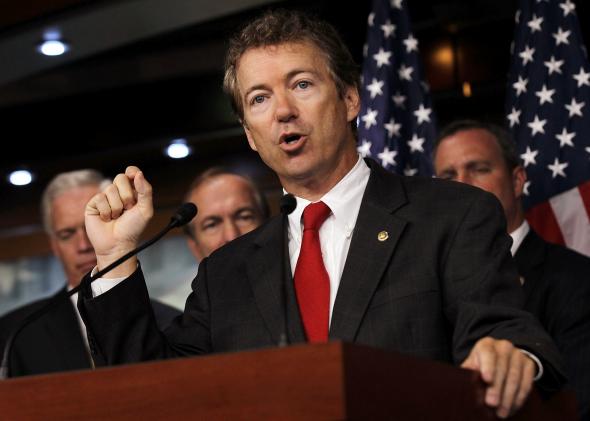Mitch McConnell, Rand Paul, and the Insult That Probably Wasn’t

Photo by Alex Wong/Getty Images
Brian Beutler noticed something from Kentucky's politicking weekend. At a Republican breakfast, Sen. Mitch McConnell commented on Sen. Rand Paul's presidential ambitions by saying this: "I can say this without fear of contradiction: He is the most credible candidate for president of the United States since Henry Clay." Most commentary about the line has treated it like a compliment; Sam Youngman, who was there, assumed McConnell was talking about the most credible presidential hopeful from Kentucky.
But Beutler heard a veiled insult. "Clay is McConnell’s hero," he wrote.
Rand Paul shares no such affinity. Clay was the “Great Compromiser.” On that abstract score at least, Paul hails from the tradition of John C. Calhoun, not of Henry Clay, even though ironically he now sits at Clay's (and McConnell's) old desk in the Senate. Paul broadsided Clay in his maiden Senate floor speech in February 2011—an unexpected heresy from a freshman politician from Kentucky, which was probably actually directed at McConnell (who keeps a portrait of Clay in his Senate office) rather than at random history buffs who might’ve been watching C-SPAN at the time. It was the legislative equivalent of a subtweet.
If you haven't read Paul's maiden speech in a while—and really, what's been keeping you?—he contrasted Henry Clay negatively with his cousin, the abolitionist Cassius Clay. "Henry Clay's life story is, at best, a mixed message," explained Paul. "Henry Clay's great compromise was over slavery. One could argue that he rose above sectional strife to carve out compromise after compromise trying to ward off civil war. Or one could argue that his compromises were morally wrong and may have even encouraged war, that his compromises meant the acceptance during his 50 years of public life of not only slavery, but the slave trade itself. In the name of compromise, Clay was by most accounts not a cruel master, but a master nonetheless of 48 slaves. He supported the fugitive slave law until his death. He compromised on the extension of slavery into new states. He was the deciding vote in the House to extend slavery into Arkansas."
As Beutler remembers, McConnell did not stick around for the entire speech. But when I asked McConnell's campaign manager Jesse Benton about the line, Benton—who worked for Ron and Rand Paul at the highest levels—dismissed the "diss" theory.
"There hasn't been a McConnell/Paul rift for years," said Benton. "They get along great. This was meant to be a great compliment."
A meaningful one, at least. After all, Abraham Lincoln was born in Kentucky. Zachary Taylor, who actually won the presidency, lived there most of his life. Clay lost three bids for the presidency, losing the closest of them—1844—when, as Paul said, votes for the anti-slavery Liberty Party spoiled him in New York. But McConnell idolizes Clay, and since 2011, when Paul made that speech, he has slowly walked away from his image as an uncompromising Tea Party candidate, into a more comfortable and warmly covered image as a bridge-building civil liberties advocate.
Maybe McConnell was trying to slip one past a room of Republicans. Or maybe he meant it. I'm in the "meant it" camp, and mark this as a telling and aspirational compliment to a politician that McConnell has an understanding with.
Also, if Paul vacates his seat to run for president, McConnell can summon Trey Grayson back.
